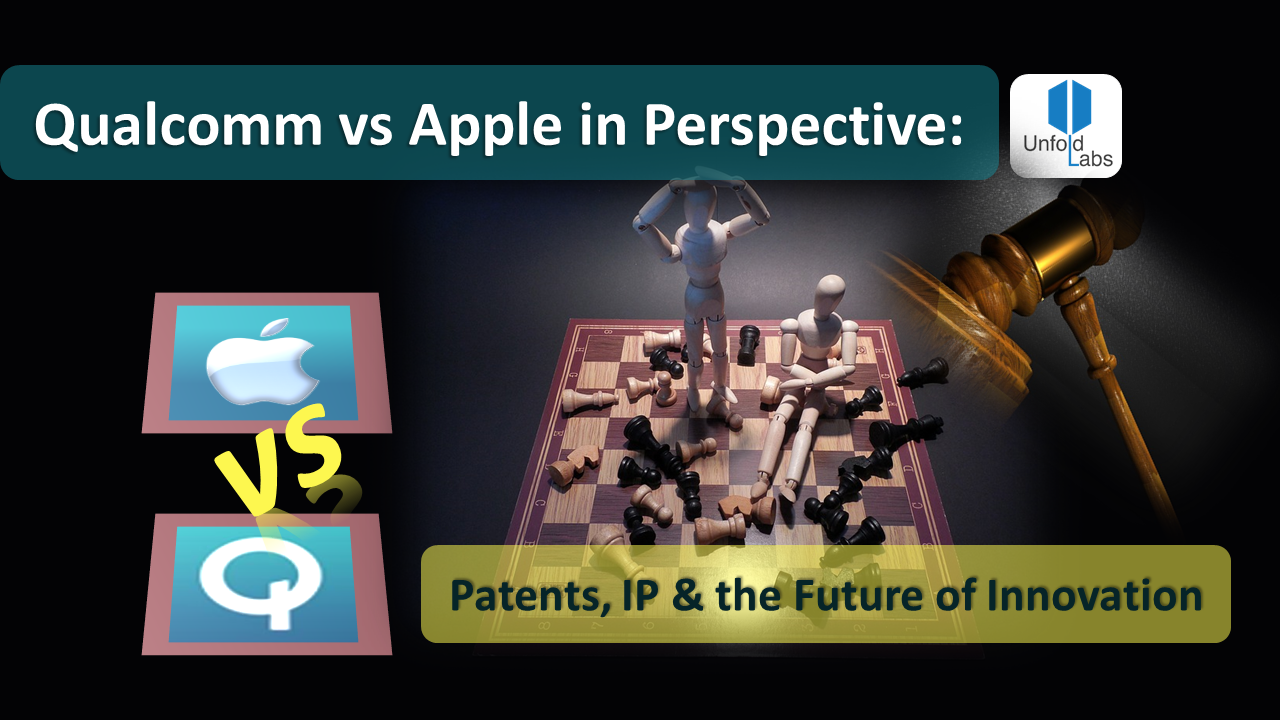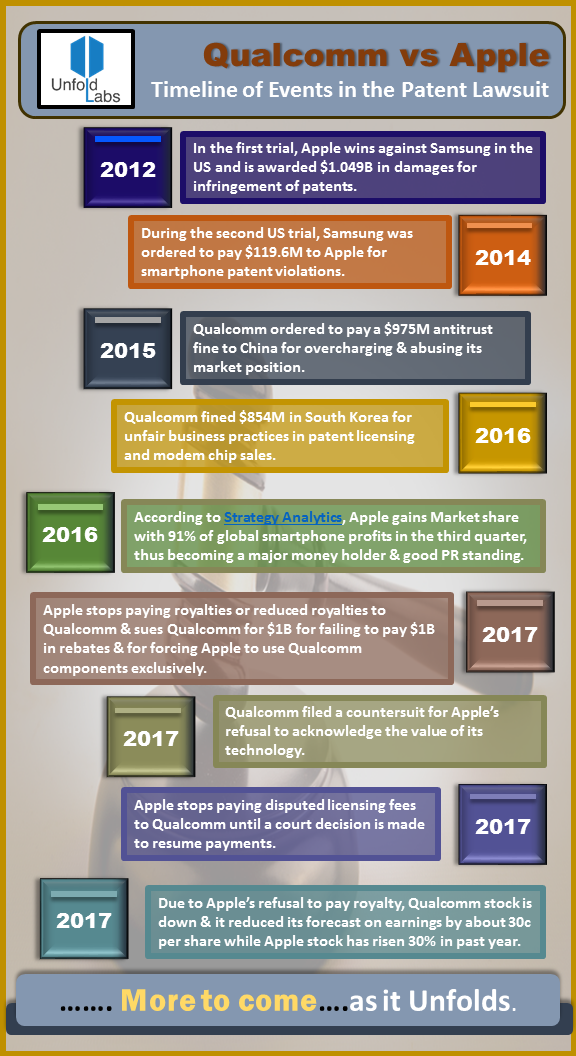Qualcomm vs Apple in Perspective
Patents, IP & the Future of Innovation

The technology industry has been innovating rapidly. Today it's hard to imagine life without a smartphone or other cool tech innovations, especially since they've become an essential part of our lifestyle. The pace of innovation is about to accelerate even more. The wireless industry will see more demand for IoT devices such as wearables, connected cars, and smart homes. According to Deloitte's 2017 Telecommunications Outlook, US and Global Telecommunications sector is predicted to be a big year for Mergers & Acquisitions in 2017.
It is not surprising that the growth of the technology market has led to more competition and sometimes competitiveness leads to lawsuits.
Intellectual Property infringement seems to have become the norm these days. Facebook, for example, has been copying Snapchat's features, including Snapchat Stories, Snapchat Camera, and Snapchat image filters. Apple, Google, Microsoft, Samsung, Facebook and other large companies have been stepping over each other's toes — and are willingly moving around with a strong assumption they can be sued anytime.
The reason why this has happened is simple. The US Patent system is woefully outdated. The US Patent Office was created in 1790 and issued its first patent on July 31, 1790 for the process of making potash — a component in fertilizer. It goes without saying that patentable items have changed significantly since then, but the patenting process has not kept up with the rapid pace of innovation and change in technology. As a result, patent litigation is rampant and has included some of the biggest names in the industry.
Patent litigation fall into any one of the three general categories:
- Large vs Large Company — both have the money to spend — and get hit on branding and/or product innovation and positioning.
- Large vs small company — the small company is usually killed due to lack of funds — or paid off in out of court settlements due to inability to fully defend itself.
- Small company vs small company — the company that can sustain money spent in the legal system usually wins
Oracle vs Google — In 2010, Oracle sued Google claiming copyright and patent infringement against Google's Android OS for using 11,500 lines of Java code. In 2012, the jury found in Google's favor deciding that Google did not infringe on Oracle's patents and that Google's Java APIs were not copyrightable and therefore fair use.
In 2014, the Federal Circuit ruled in Oracle's favor on the issue of copyright, but a petition to order judicial review was denied by the United States Supreme Court. A second trial began in May 2016, and the jury again sided in favor of Google. In October 2016, Oracle filed its appeal.
That APIs are not copyrightable is a huge advantage to developers of third-party services who have free access to APIs for building software applications. If Oracle, who owns the original Java code language, could claim ownership, developers who use those APIs would not be able to afford defending themselves against big companies like Google.
Apple vs Samsung — The lawsuit between Apple and Samsung began when Apple initiated a patent infringement action against Samsung in over 50 lawsuits worldwide. In the first US trial in 2012, Apple accused Samsung of utility and design patent infringements and Samsung accused Apple of infringing on various US patents. The first verdict awarded Apple $1.049B in damages for infringement of patents, including "On-screen Navigation" and "Tap To Zoom." In 2014, however, Samsung sought a re-trial at the US District Court. In May 2014, during the second US trial, Samsung was ordered to pay $119.6M to Apple for smartphone patent violations. Apple was found guilty of infringing one of Samsung's patents and Samsung was awarded $158,400.
Ongoing lawsuits have led to money being awarded, but delays in the hearings have helped both companies. The delays have helped Apple's reputation as a higher innovation company and although it has helped Samsung to sell newer phones, they are now regarded as a copycat company. The lawsuits have tarnished the branding of Samsung. It lost track and focus of its quality in products as started on its path of "faster innovation" without quality checks in place.
Facebook/Oculus vs ZeniMax — The games company, ZeniMax, sued the Facebook-owned virtual reality company, Oculus, for improperly using code from ZeniMax to build the Oculus Rift VR headset. The counts in the case against Facebook/Oculus were Common Law Misappropriation of Trade Secrets, Copyright Infringement, Breach of Contract, Tortious Interference with Contract, Unfair Competition, and Trademark Infringement and False Designation.
Although the jury found Oculus not guilty of stealing trade secrets, the company, its CEO and cofounder were ordered to pay a total of $500M to ZeniMax for violating a non-disclosure agreement, copyright infringement, and false designation. The matter is far from over as Oculus plans to appeal the verdict.
While Facebook/Oculus has to make payments to Zenimax, being found innocent in a jury trial is a PR victory. Zenimax is the overall winner as it not only gets monetary compensation, but it was found that theft of their intellectual property occurred. Now Zenimax has another law suit against Samsung for integrating the technology into its Gear VR.
Qualcomm vs Apple
In another lawsuit involving Apple, this time regarding licensing and royalty fees, Apple sued Qualcomm for allegedly charging higher royalties on patents and forcing the company into exclusive deals. Qualcomm, which depends on royalties for licensing its intellectual property, has countersued Apple and claims that iPhones would not be possible without the chipmaker's technology and alleged that Apple breached their license agreements.
Apple learned a great deal in its lawsuits against Samsung — the PR, the timing delays, and full court pressure that saw Samsung tumble — and is trying to put the learnings back to work on this law suit.
Apple saw an opening when Qualcomm started to lose the IP/patent licensing lawsuits in China and Korea. Apple had a greater PR standing in the consumer mindset, whereas Qualcomm was not known to the average consumer. This was an added advantage for Apple in making its move against Qualcomm.
After Qualcomm paid fines in China and Kore for antitrust violations and unfair business practices in patent licensing and cellular chip sales, Apple saw this as an advantage to push Qualcomm. Apple, who is suing the chip maker for nearly $1B, continues to place a hold on paying royalties to Qualcomm and believes they should only be charged royalties for the price of the cellular chip used on their devices like the iPhones and iPads.
Following is a timeline of events to the lawsuit:

Public Opinion
Public opinion on the lawsuits between the tech giants varies. This is mainly because:
a. People don't have a good understanding of patents, which are crucial in protecting intellectual property. Without patents in the technology industry, it would be difficult to encourage companies to invest in new technology. Patents on software are broad, and that's why suing based on patent infringement has become prevalent.
b. Some people don't understand technology and how it works. Therefore, it may be difficult to understand exactly what companies are specifically suing one another over and why it matters.
c. People don't understand why companies like Qualcomm invests in technology. Not only does Qualcomm create technology they invest in startups developing next-generation technologies like Virtual Reality, IoT, and robotics. This means they have more at stake when lawsuits are filed against them, especially in the case of patent licensing.
Our Take
Qualcomm continues to defend its IP and resulting royalties which are the lifeblood of their business. Because Qualcomm is a B2B focused company they found themselves highly disadvantaged when they encountered mighty Apple's PR.
Apple, on the other hand, does not rely on royalties from IP, but rather uses its IP to create unique user experiences. When Apple feels threatened by IP infringements, lawsuits are brought upon companies that are a threat to them to protect their IP and standing.
The US Patent & Trademark System has not kept up with changes in technology and needs an overhaul. Not only is the system not relevant to the times, it also fails to protect small innovators against deep pocket giants.
Although bullied by Apple, Qualcomm is fighting back by countersuing as it tries to prove that without its chip technology, iPhones/iPads would not have been as successful as they have become. However, while this battle is Apple v Qualcomm, the issue here is much larger. The fight is really about whether we as consumers, technologist and gadget enthusiasts will sit on the sidelines while the big companies with deep pockets and marketing muscle denigrate the IP system to the point where innovation is no longer about performance and more about gamesmanship. With technology companies in such fierce competition with one another, we will continue to see how smaller company's limits will be tested in the cases brought about by IP trolls — and more and more lawsuits in the horizon.
We side with Qualcomm on this matter — and we strongly feel that the IP holder needs to be paid royalties for time and money spent on research and IP. Just like Apple wanting to defend their IP against Samsung, Qualcomm needs to defend their IP and also work on the public opinion aspects to be the winner against Apple this time. If we allow this path to continue we will start to see innovators and inventors disappear. If a behemoth like Qualcomm can have their IP at risk we can only imagine where this could go with smaller companies and victims of IP Patent Trolls. All of this could have a disastrous effect on the rapid growth we are currently seeing in wireless, mobility and IoT.
. . .
. . .
This post was written by Asokan Ashok, the CEO of UnfoldLabs. Ashok is an expert in driving customer insights into thriving businesses and commercializing products for scale. As a leading strategist in the technology industry, he is great at recommending strategies to address technology & market trends. Highly analytical and an industry visionary, Ashok is a sought after global high-tech industry thought leader and trusted strategic advisor by companies.
Entrepreneur. Inventor. Product Ideation. Strategist. Visionary. Evangelist. Architect.

